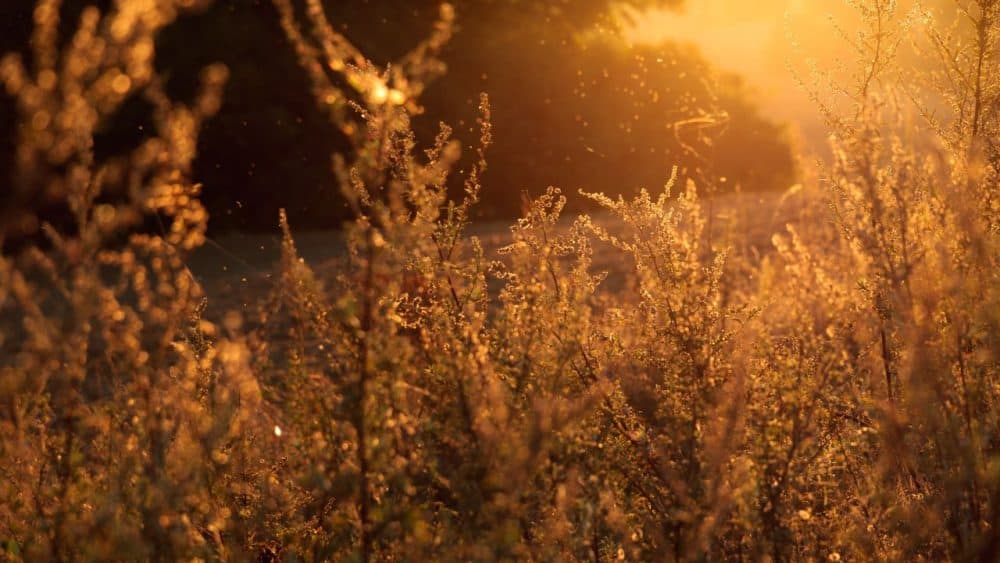Advertisement
Bad Allergies, Yes. Worst Boston Year Ever? Experts Say No, But Perfect Storm Of Trees, Grass, Mold

I got a call from the school nurse this week: my daughter had an itchy rash on her arms and neck and red blotchy patches around her mouth.
"My best guess is it's allergies," the nurse said, suggesting Benadryl and hydrocortisone cream. "This is a particularly bad season. Kids who never had allergies are coming in. Kids who take Zyrtec or Claritin in the morning are still coming in — their eyes so inflamed and irritated."
Mention allergies these days and you're sure to get a story: a colleague left Cape Cod early this weekend, because her allergies got so bad. "The pollen was everywhere," she said. "It was even on my dishes."
Micheline Maynard, a senior producer at Here & Now, sent me an email detailing her own allergy hell:
Last week, I had a bout of allergies that had me weeping in the newsroom, and sneezing and coughing. (I was apologizing to my colleagues and saying, “I’m not crying!”) Claritin did nothing, and I took half a Sudafed 12-hour, which helped a little.
I went to Michigan over the weekend, which is basically the same latitude as Boston, and enjoyed a problem-free weekend. I slept with my windows open, I did things out in the garden, and felt completely recovered. No coughing, sneezing, no headache.
Within an hour of getting back to Boston on Monday, my head was completely stuffed up. I was sneezing and coughing, and feeling generally blah... I actually Googled “severe allergies” because I’d never experienced anything like it.
Dr. Elisabeth Poorman, a CommonHealth contributor and third-year medical resident at Cambridge Health Alliance, said she's experiencing bad allergies this year, "and [I] never have since moving from Atlanta, where pollen is a way of life."
So is this season truly the most awful for allergy sufferers — the worst one ever — or, as one doctor suggests, do a high percentage of reporters and their friends just happen to have allergies, hence the outcry?
Advertisement
Dr. Anna Kovalszki, M.D., clinical director in the Allergy & Inflammation division at Beth Israel Deaconess Medical Center, offers a reality check: "I think this year is not as bad as last," she said. "This year is definitely causing symptoms -- like other years in the past. But every year I have patients who say, 'this is the worst year ever.' "
Last year, when the thaw finally came following that freezing, snowy winter, "everything started to bloom," Kovalszki said, and that led to extreme allergy symptoms that felt like they'd come on overnight.
She said patients were arriving last year with their eyes swollen shut, for instance, and due to such intense symptoms, she prescribed strong medications that she normally doesn't, like oral prednisone — a steroid typically reserved for asthma sufferers.
"This year is definitely causing symptoms -- like other years in the past. But every year I have patients who say, 'this is the worst year ever.'"
Dr. Anna Kovalszki
This year, she says, due to the mild winter, the allergy season seemed to start earlier. And right now "tree pollen is the worst, but the grasses are starting to come up too so there's a double whammy: if you're allergic to both, you would have some cumulative symptoms."
Dr. Mariana Castells, M.D., an allergist at Brigham and Women's Hospital, agreed that last year allergy sufferers exhibited more severe symptoms that came on abruptly.
But this year, she said, there's a "prolonged" allergy season that started earlier, with patients having "progressive" symptoms since March. Extreme temperature shifts didn't help, she said, noting that the season could drag on: "There will be pollen very, very late in the season."
"At this moment there's a lot of tree pollen in the air and a lot of grass pollen in the air. Also, with the rain, there's a lot of mold, so mold spores are something people can be allergic to," Castells said, noting that the most common symptoms include itchy eyes and nose, nasal congestion and sneezing, post nasal drip, sinus pressure, and coughing.
If you suffer from allergies, though, it doesn't much matter which season is the worst. Right now, it seems, there's no escape, with pollen visible everywhere: in the yard, on the car and, at least for my colleague, on the dishes.
And in general, seasonal allergies may be getting worse, doctors suggest. It could be due to overall warming temperatures, or other factors. Kovalszki said that epidemiologic studies looking at food and peanut allergies suggest that incidences are rising.
"I suspect the environmental allergies are as well, there are certainly studies suggesting this with pet dander and also pollens," she said.
Why? "The most discussed theory is called 'hygiene hypothesis' as to why it is happening: we aren’t exposed to enough microbes, dirt, etc. and hence our bodies are finding something else to attack," Kovalszki explained.
It's tough to get a full and accurate picture of allergy sufferers around the region. The state Department of Public Health doesn't track seasonal allergies, for instance.
The illness trackers at HealthMap, a group based at Boston Children's Hospital that posts reports on disease outbreaks, says there's nothing in the data worth noting this year about seasonal allergies.
"Maybe it's not worse, but just longer given our mild winter?" suggests HealthMap's Colleen M. Nguyen. "Actually [I] went to the allergist last week, and it was quite busy in the office."
Readers, tell us your allergy story. Are things worse this year? Better? And how are you coping?
